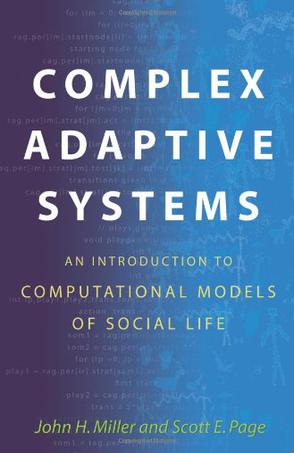-

非线性科学与复杂性科学
非线性科学被誉为20世纪继量子力学和相对论之后的三次科学革命,而复杂性科学被誉为21世纪的科学。本书全面地介绍了非性线科学与复杂性科学的基本概念、基本方法、基本理论及其应用。全收分三篇共12章,内容包括系统科学序篇(第1章):系统科学引论;非线性科学篇(第2~6章):耗散复杂适应系统理论、复杂适应系统的模型、复杂系统的模型、复杂系统的建模方法及工具。 全书内容取材广泛而新颖,具有多学科融合的交叉性、前沿性和普适性。写作上力求由浅入深、举一反三,融会辩证思维的哲学思想,力争给读者以科学思想方法论的深刻启迪。本书可作为高等院校工学、理学、生命科学、管理科学、社会科学、军事科学、环境科学、地球科学、农林科学及医药卫生等领域相关专业研究生公共选修课的教材,也可作为广大自然科学和社会科学工作者、研究人员、工程技术人员及高级管理人员的自学参考书。 -

自然之数
《自然之数:数学想象的虚幻实境》从“虚拟幻境机”写起,条分缕析大干世界中无处不在的模式,既展示自然之模式背后的学之美和对称性,又呈现无规无形和对称性破缺的另一种模式之魅。从动力系统理论、分形几何、复杂性生命的节律,作者以“形态数学”之梦作结。学到底有何用,数学究竟是什么,相信读者会有所启迪的。 -

Complex Adaptive Systems
This book provides the first clear, comprehensive, and accessible account of complex adaptive social systems, by two of the field's leading authorities. Such systems - whether political parties, stock markets, or ant colonies - present some of the most intriguing theoretical and practical challenges confronting the social sciences. Engagingly written, and balancing technical detail with intuitive explanations, "Complex Adaptive Systems" focuses on the key tools and ideas that have emerged in the field since the mid-1990s, as well as the techniques needed to investigate such systems. It provides a detailed introduction to concepts such as emergence, self-organized criticality, automata, networks, diversity, adaptation, and feedback. It also demonstrates how complex adaptive systems can be explored using methods ranging from mathematics to computational models of adaptive agents. John Miller and Scott Page show how to combine ideas from economics, political science, biology, physics, and computer science to illuminate topics in organization, adaptation, decentralization, and robustness. They also demonstrate how the usual extremes used in modeling can be fruitfully transcended. -

The Structure and Dynamics of Networks
From the Internet to networks of friendship, disease transmission, and even terrorism, the concept - and the reality - of networks has come to pervade modern society. But what exactly is a network? What different types of networks are there? Why are they interesting, and what can they tell us? In recent years, scientists from a range of fields - including mathematics, physics, computer science, sociology, and biology - have been pursuing these questions and building a new 'science of networks.' This book brings together, for the first time, a set of seminal articles representing research from across these disciplines. It is an ideal sourcebook for the key research in this fast-growing field. The book is organized into four sections, each preceded by an editors' introduction summarizing its contents and general theme. The first section sets the stage by discussing some of the historical antecedents of contemporary research in the area. From there the book moves to the empirical side of the science of networks before turning to the foundational modeling ideas that have been the focus of much subsequent activity. The book closes by taking the reader to the cutting edge of network science - the relationship between network structure and system dynamics. From network robustness to the spread of disease, this section offers a potpourri of topics on this rapidly expanding frontier of the new science. -

Reinventing the Sacred
我们不需要认为有神的存在,但是我们不妨假设用神这样很模糊的概念,去泛指这样的生物现象里面的复杂的生生不息的创造力,这种创意,这种偶然出现的东西,这种预先发明的器官,还有各种生物机能之间的配合,这样的东西,我们就能够尊敬它,看到演化的奇迹,我们不需要假设有神,也能够为它而迷倒,相信这样的东西是神圣的。 -

A New Kind of Science